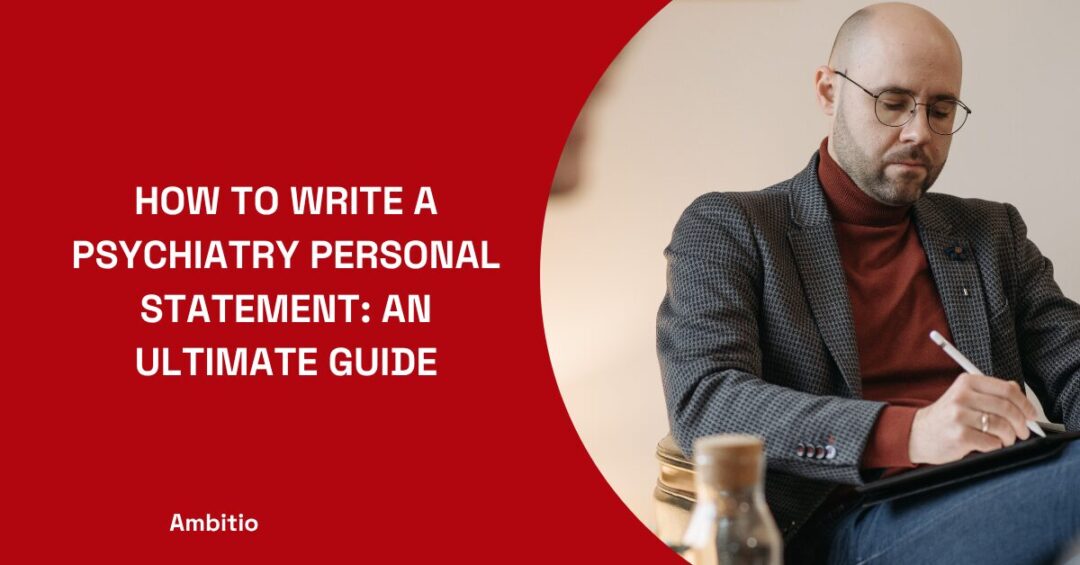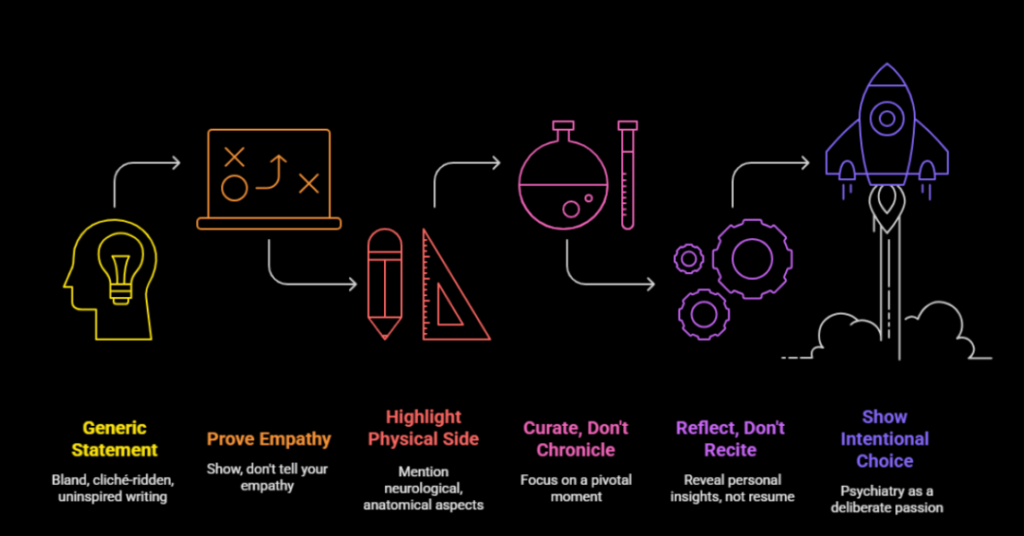28 May 2025
7 minutes read
How To Write A Psychiatry Personal Statement: An Ultimate Guide

Key Takeaways
- Craft a psychiatry personal statement that shows insight, not just interest—only 4% make it to top programs.
- Focus on real patient moments that reveal how you think, not what you’ve done.
- Highlight psychiatry’s medical depth by connecting mind, behavior, and biology.
Only 4% of applicants get into top psychiatry residency programs—so yes, your personal statement actually matters. Most medical students slap together clichés about empathy, toss in a shadowing story, and hope it sticks. But program directors have seen it all, and the fluff gets filtered fast. If you’re serious about the field of psychiatry, where understanding the human mind and brain is not a flex but a responsibility, you need more than passion. You need precision.
In this guide, I’ll show you how to write a personal statement that sounds like you, not like every other internal medicine applicant trying to switch lanes.
5 Tips To Write A Psychiatry Personal Statement
I have been helping students writing their personal statements. And every psychology personal statement I came across sounds like it was written by a committee of well-meaning robots. “I’m an empathetic person.” “Mental illness needs more awareness.” “The brain is fascinating.” Yawn.

Well, you’re not here to recycle the usual. You’re applying to a psychiatry residency program, not narrating a TED Talk on kindness. If you want to be a psychiatrist, your personal statement better prove you understand more than just buzzwords. You’re stepping into a specialty that dissects internal states, interprets anatomical mysteries, and navigates what others run from: psychiatric disorders, insomnia, and the tangled landscape of neurological tissue.
Here’s how to write a statement that actually makes someone stop and read.
1. Don’t Tell Them You’re Empathetic—Prove It in One Line
Every applicant claims they’re empathetic. But real empathy isn’t saying “I care.” It’s noticing your patient clenches their jaw before breaking down. It’s hearing what wasn’t said. Show that through micro-observations. One sentence with clinical insight into a patient’s internal states can reveal more about you than a paragraph of self-praise.
2. Mention Psychiatry’s Physical Side—Yes, It Has One
Psychiatry isn’t just conversation and compassion. Real ones know it’s also about neurological tissue, anatomical nuance, even a whisper of neuropathology. Slip in a line about how understanding the anatomical basis of insomnia or depression deepened your respect for the field. Program directors love applicants who don’t see psychiatry as a “softer” path out of medical school.
3. Don’t Chronicle—Curate
Stop treating your personal statement like a diary. It’s not “Then I did this, then that.” Choose one patient, one rotation, or one turning point that sparked your interest in this specialty. Dig into that moment. Show how it made you think differently about mental illness, about being a psychiatrist, about the fragility of psychiatric care. Leave them thinking: this one gets it.
4. Make the Statement a Mirror—Not a Resume
Your residency application already has your GPA, your CV, your letters of recommendation, and even your statement of purpose. Your statement should tell us who you are when none of those are in the room. What changed your lens on the human mind? What failure taught you to listen better? What made you respect the silence in psychiatric evaluation as much as the speech?
5. Show That You Chose Psychiatry—It Didn’t Just Happen
Too many applicants fall into the trap of “psychiatry clicked after everything else didn’t.” Avoid that. Even if you rotated through internal medicine or surgery, show how psychiatry wasn’t Plan B—it was the natural end of your curiosity about the human mind, behavior, and the biology behind breakdowns. Mention how you connected that to real clinical work—not just theory.
3 Psychiatry Residency Personal Statement Example That Works For All
What you’re about to read aren’t just personal statements—they’re admission tickets. These examples helped my students land spots in top psychiatry residency programs at places like Columbia, Stanford, MIT—and yes, even Harvard. Why? Because they don’t just talk about psychiatry. They think like a psychiatrist already.
Here are the 3 best personal statements for residency in psychiatry program:
Psychiatry Personal Statement Example #1
I still remember the patient who wouldn’t speak—not out of defiance, but because his paranoia told him every word was a trap. I wasn’t supposed to be involved. I was a third-year medical student shadowing on the unit. But I noticed how he responded to patterns—his eyes flickered when we mirrored his posture. I leaned in, quietly copied his body language. He spoke his first sentence in days.
That moment didn’t feel like power. It felt like responsibility. It taught me that psychiatric care isn’t loud. It’s subtle, layered, and deeply human. It’s about decoding internal states no lab value will show. That patient made me see mental illness not as something to treat, but as something to understand—and he showed me that listening doesn’t start with ears, but with presence.
I don’t view psychiatry as separate from the physical. The mind lives in neurological tissue, in anatomical signals misfiring under emotional weight. My interest grew sharper when I read neuropathology reports that mirrored my patients’ symptoms—proof that what’s invisible has roots. That connection between science and story is where I want to live.
I’m applying to a psychiatry residency program because this specialty demands more than knowledge. It demands precision, reflection, and the ability to sit with ambiguity. I’m not looking for easy answers. I’m looking for the right questions—and I want to keep asking them as a future psychiatrist.
Psychiatry Personal Statement Example #2
Most people think a psychiatric ward is loud, chaotic, and unpredictable. But the scariest moment I experienced there was silent: a patient sat completely still, eyes wide, caught in a wave of panic attacks that paralyzed her. It was my first week on the psychiatric floor during my internal medicine rotation. The resident asked me to step back, but I stayed. I didn’t speak. I didn’t move. Eventually, she looked at me and whispered, “You’re not scared?” That’s when I knew—this wasn’t just a field I admired. It was the one I was meant to specialise in.
Before applying to psychiatry residency, I earned a degree in psychology, focused on how internal states transform into behaviour. But medical school added layers. I began to see the anatomical and biological basis of fear, the biological basis of psychiatric disorders like schizophrenia, and how the dynamic between the mind and the body isn’t a metaphor—it’s measurable. I even worked in a research facility studying how trauma affects neural pathways. It sharpened my clinical instincts and gave me specific examples to draw from when working with real patients.
What makes a good psychiatrist isn’t just knowledge. It’s what the best psychiatrists in the county have: patience, clarity, and the ability to read what’s not obvious. I don’t want to just treat. I want to listen. Learn. Translate what I know into meaningful patient care. I’ve studied psychopathologies of mental illness, yes—but more importantly, I’ve sat with them, one-on-one, and tried to understand.
Psychiatry Residency Personal Statement Example #3
The patient walked in convinced her dreams were controlling the weather. What struck me wasn’t the delusion—it was how scared she was of losing control. As a premedical student, I might’ve dismissed it as bizarre. But during my psychiatry rotation, I saw it for what it was: a desperate attempt to make sense of a world that no longer followed rules. That moment didn’t just interest me. It changed my view of what it means to help my patients.
I’d always been drawn to the mind and behavior, but I used to think of psychiatry as interpretive. Now I know it’s precise. Every symptom has a thread—sometimes anatomical, sometimes emotional, often both. I became obsessed with tracing those threads. During my time on the psychiatric floor, I worked with patients struggling with hallucinations, panic attacks, and trauma. I studied the brain and the mind, and how one could betray the other. That complexity made me realize this psychiatry program is where I belong.
My experience in a research facility taught me how to dissect neurological tissue, but what stayed with me more was the story behind the data. The case of a patient with early-onset schizophrenia matched almost perfectly with what we saw under the microscope. It was a wake-up call: you can’t treat disease without understanding the person who carries it. That belief grounds my approach to medicine—and my future in residency in psychiatry.
This field isn’t a shortcut. It’s one of the hardest. And that’s why I chose it. I’ve read the program director surveys, taken every tip for writing seriously, reflected on every patient who’s let me into their world. I don’t just want to join a psychiatry residency—I want to train in a place that challenges how I think, sharpens how I listen, and pushes me toward becoming the kind of psychiatrist who doesn’t just diagnose, but truly connects.
Conclusion
I always advice my students – Your statement should reflect how you think, what you notice, and how you handle discomfort. This field isn’t for performers; it’s for listeners, analysts, and those who stay curious in the face of chaos. A neuropathologist doesn’t guess—they study patterns, history, and structure. Do the same in your writing. Make every sentence show that you’re already doing the work, not just waiting for permission to start.
Most applicants struggle to write a perfect personal statement but end up sounding arrogant — but you won’t. At Ambitio, our AI-powered study abroad experts help you craft a powerful, standout statement that gets noticed. No fluff, no clichés—just a compelling story that proves you belong. Schedule a call with Ambitio’s experts.
FAQs
Can international students apply for a master’s in psychiatry or mental health abroad?
Yes, most universities abroad accept international students for master’s programs in psychiatry or related fields
What are the main types of master’s programs available in psychiatry?
Programs include research-focused MScs, clinical mental health sciences, and (in some countries) combined clinical and research training
What are the typical entry requirements for a master’s in psychiatry abroad?
Requirements usually include a relevant bachelor’s degree, sometimes clinical experience, and proof of English proficiency
Is a medical degree required to study a master’s in psychiatry abroad?
For clinical or research MScs, a medical degree is not always required, but for certain PhD or residency/PhD programs, a medical degree may be necessary
Are there scholarships or funding options for international students?
Many universities offer scholarships, grants, or funding information for postgraduate students
What is the language of instruction for these programs?
Many programs are taught in English, especially in the UK and some European countries; others may require local language proficiency
How long does a master’s in psychiatry abroad usually take?
Full-time programs typically last one year; part-time options may take two to three years

You can study at top universities worldwide!
Get expert tips and tricks to get into top universities with a free expert session.
Book Your Free 30-Minute Session Now! Book a call now




























